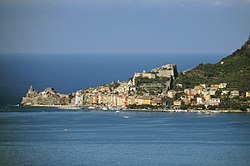Portovenere
| Porto Venere | |
|---|---|
| Comune | |
| Comune di Porto Venere | |

Panoramic view from Lerici
|
|
| Location of Porto Venere in Italy | |
| Coordinates: 44°3′N 9°50′E / 44.050°N 9.833°E | |
| Country | Italy |
| Region | Liguria |
| Province / Metropolitan city | La Spezia (SP) |
| Frazioni | Le Grazie, Fezzano |
| Government | |
| • Mayor | Matteo Cozzani |
| Area | |
| • Total | 7 km2 (3 sq mi) |
| Elevation | 8 m (26 ft) |
| Population (1 January 2014) | |
| • Total | 3,763 |
| • Density | 540/km2 (1,400/sq mi) |
| Demonym(s) | Portoveneresi |
| Time zone | CET (UTC+1) |
| • Summer (DST) | CEST (UTC+2) |
| Postal code | 19025 |
| Dialing code | 0187 |
| Patron saint | The White Madonna |
| Saint day | August 17 |
| Website | Official website |
| Portovenere, Cinque Terre, and the Islands (Palmaria, Tino and Tinetto) | |
|---|---|
| Name as inscribed on the World Heritage List | |
 |
|
| Location | Italy |
| Type | Cultural |
| Criteria | ii, iv, v |
| Reference | 826 |
| UNESCO region | Europe and North America |
| Inscription history | |
| Inscription | 1997 (21st Session) |
Porto Venere (Italian pronunciation: [ˌpɔrto ˈvɛːnere]; until 1991 Portovenere) is a town and comune (municipality) located on the Ligurian coast of Italy in the province of La Spezia. It comprises the three villages of Fezzano, Le Grazie and Porto Venere, and the three islands of Palmaria, Tino and Tinetto. In 1997 Porto Venere and the villages of Cinque Terre were designated by UNESCO as a World Heritage Site.
The ancient Portus Veneris is believed to date back to at least the middle of the 1st century BC. It has been said that the name refers to a temple to the goddess Venus which was sited on the promontory where the church of Peter the Apostle now stands. The name has also been linked to that of the hermit Saint Venerius. In Roman times the city was essentially a fishing community.
After the fall of the Western Roman Empire, Porto Venere became the base of the Byzantine fleet in the northern Tyrrhenian Sea, but was destroyed by the Lombards in 643 AD. Later, it was a frequent target of Saracen raids. First indications of the existence of a castle date from 1113, and in 1161 the walls were erected. Porto Venere became a fiefdom of a family from Vezzano before passing to Genoa in the early 12th century. In 1494, it suffered a devastating bombardment from the Aragonese fleet during their war with Genoa: subsequently the old part of the town declined in importance, giving way to the development of the Borgo Nuovo ("New District"), which had existed from 1139 and is centred on the church of St. Peter.
...
Wikipedia

